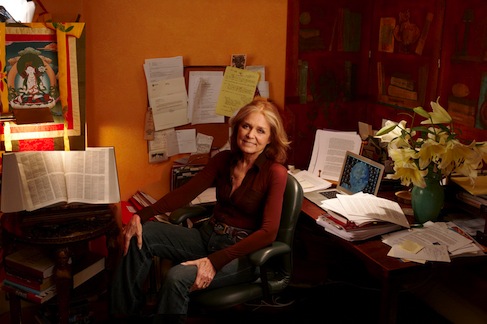HBO's involving Steinem bio gives her the first, last and only words
08/12/11 01:14 PM

By ED BARK
The late Howard Cosell had legions of love/haters, but he can't hold Gloria Steinem's handbag in that respect.
At age 77, the lightning rod embodiment of feminism and women's liberation is given an hour's time to explain herself in HBO's Gloria: In Her Own Words (Monday, Aug. 15th at 8 p.m. central)
It's something of a Valentine, as were HBO's earlier Teddy: In His Own Words and JFK: In His Own Words films. And it seems safe to predict that HBO isn't likely to ever air a right-of-center documentary such as Nixon: In His Own Words.
Still, the Steinem film is consistently interesting while at the same time being deferential to its subject. She tells her story without entirely sparing herself, although an unauthorized and less subjective film no doubt would have sanded off some of the varnish.
"We didn't feel we had the right to be equal, or to be angry," a current-day Steinem says of times when women were expected to be subservient to men both at home and in the workplace.
She first came to fame in 1963 for a Show magazine expose on life as a bunny at the New York Playboy Club. Steinem went to bunny training school under the name of Marie Catherine Ochs, working clandestinely for several weeks to gather more first-hand material. Kirstie Alley later played Steinem in the 1985 TV movie A Bunny's Tale.
"You're paid very little, the trays are heavy, your feet hurt," Steinem reflects. "I learned what it's like to be hung on a meat hook." (She lately has called for a boycott of NBC's upcoming fall series The Playboy Club after reserving judgment late last month during a Television Critics Association "press tour" session on behalf of the HBO documentary.)
Steinem says she initially regretted the bunny escapade because "it made me unserious" to prospective employers when she sought other writing work. But she later "became glad I did it" after numerous past and present bunnies thanked her for telling the truth about working conditions at the Playboy clubs.
She became fully invested in the movement after attending a 1969 hearing at which women spoke out for legalized abortion. Steinem earlier had an abortion at age 22, but "I never told anybody," she confides in the film, which is directed by Peter Kunhardt (Freedom: A History of Us).
In those days, "there was no word for sexual harassment," she says. "It was just called life." The burgeoning feminist cause was easy enough to ridicule. Former variety/game show host Garry Moore is recaptured in a 1972 radio interview in which he describes Steinem as "extremely attractive" before adding that "most of the women I see in the women's liberation movement frankly couldn't lure me out of a burning building."
Steinem founded Ms magazine in 1972, with predictions of its quick demise a little premature for a publication that exists to this day. Anchor Harry Reasoner, one of the early doomsayers later was man enough to apologize on the air for being wrong.
Many other men were having none of it, though. An Esquire magazine article ridiculed Steinem in a comic book segment that depicted her as a superficial, self-aggrandizing superficial feminist. And a "Pin the cock on the feminist" placard placed outside theMs. magazine offices showed a fully nude illustration of Steinem surrounded by male appendages. This being HBO, we see the entire display, which remains a jaw-dropper.
Steinem could be barbed as well on the subject of men's sexuality. As the film shows, she once referred to Richard Nixon as "the most sexually insecure chief of state since Napoleon."
It's also made clear that Steinem adored fellow activist Bella Abzug but wasn't a fan of Betty Friedan -- and vice-versa. Her principal regret, it seems, is the way she largely abandoned her parents.
Steinem's father, Leo, was both charming and financially irresponsible, she says. And her mother, Ruth, had a nervous breakdown and was constantly depressed. They had been long divorced when her father was seriously injured in a car accident in Orange County. She never went to see him for fear she'd end up being his caretaker, as Steinem was for her mother during what she says was a lonely and "neglected" childhood. In later years, Steinem also suffered from depression -- and wrote a book about it.
"So he died alone, and I regret that so much," Steinem says of her father.
She also has survived a bout with breast cancer and the death of her husband, David Bale, in 2003. They were married in 2000, a development that Steinem admits surprised both her and the world at large. In Her Own Words also shows her acting out of character by tap-dancing during a Barbara Walters special at the urging of the host, who sings "Me and My Gal" in accompaniment. It's pretty cringe-worthy, but also shows that Steinem, who learned to tap as a kid, can be more than a single-minded, deadly serious pretty face.
None of this will convert those who believe, as a caller to a 1990 Larry King Live program expressed, that Steinem is "one of the primary causes of the downfall of our beautiful American family and society today." Furthermore, Steinem should "rot in hell," the caller told her to her face.
She doesn't hope to tempt fate anytime soon. "I've so loved being here, and I do hope to be 100," Steinem says at film's end. "I love it so much. I never want it to end."
Whatever you think of her, Steinem already has led one very eventful life. In Her Own Words offers her a chance to airbrush it at will. But the film still stands as a revealing and often surprisingly intimate look at a woman whose impact and influence are undeniably indelible.
GRADE: B+
